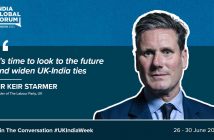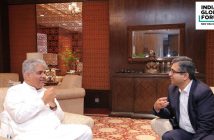An interesting insight by prominent Indian journalist Ashok Malik writing exclusively for India Inc.
EXPERT VIEW: Where will the UK feature in Modi’s World View?
Narendra Modi is the first Indian Prime Minister born after independence in 1947. He is different from several of his predecessors in that he is not a native speaker of the English language and has no educational associations or easy cultural references vis-à-vis the United Kingdom. Yet, the UK is central to his idea of India’s engagement with the world.
This would only be natural because Modi, especially in his 13 years as chief minister of Gujarat (2001-14), has given the impression of being a pragmatic, transactional, down-to-earth political administrator, focused on economic growth, investment and trade. The UK, both as a recipient of Indian investment and a source of investment, and London as a major financial capital, are important in this context.
Modi’s immediate goal will be to restore the investment cycle in India. In this, winning the confidence of the City will be essential, as will persuading other financial centres and institutions across the world. To take a longer view, Modi’s big challenge in the coming years will be to give a thrust to Indian manufacturing. He has spoken of this in his election campaign, and made particular reference to encouraging manufacturing of military or defence equipment by the private businesses in India as well as by international companies.
Currently 26 per cent FDI is allowed in the defence sector in India but Modi is almost certain to raise this cap. The UK has a strong defence industry and is the repository of key technologies that can be used to mutual benefit in Indian manufacturing facilities. This is one area of obvious partnership.
 Modi has spoken of a foreign policy that is both driven by and aimed at facilitating high GDP growth. The international institutions and diplomatic blocs the BJP’s election manifesto lays store on tend to be post-Cold War groupings with an economic or trade underpinning. Separately, Modi has also emphasised expanding India’s influence and footprint in Africa, a continent where Beijing now matters much more than New Delhi does.
Modi has spoken of a foreign policy that is both driven by and aimed at facilitating high GDP growth. The international institutions and diplomatic blocs the BJP’s election manifesto lays store on tend to be post-Cold War groupings with an economic or trade underpinning. Separately, Modi has also emphasised expanding India’s influence and footprint in Africa, a continent where Beijing now matters much more than New Delhi does.
Given this, it would be worth asking if Modi has plans for the Commonwealth. India is a natural leader of this club of 53 countries that has enormous goodwill among its African members. Innovatively reimagined, the Commonwealth could become a force multiplier for Indian foreign policy and a platform to promote developmental and technical assistance programmes. It could make Indian and British relations that much more meaningful. Recent Indian governments have not taken the Commonwealth too seriously. Perhaps Modi, with his ambitious agenda for India and its role in the world, will think out of the box.
In the past 20 odd years, the UK has gradually yielded place to the United States as India’s window to the West and the West’s window to India. As it happens, Indo-US relations are at a fairly low ebb today, with the Obama administration and New Delhi – not specifically one Indian government or the other – not seeing eye-to-eye on many issues. Here again Modi’s relative comfort with Britain and record of having worked with successive British governments as chief minister of Gujarat may just be opportune for the UK.
 Ashok Malik is a prominent news columnist in India. He writes on the increasing intersection of India’s domestic politics and foreign and trade policies.
Ashok Malik is a prominent news columnist in India. He writes on the increasing intersection of India’s domestic politics and foreign and trade policies.
![]() The above article was published in India Inc’s print edition of the India Investment Journal launched in June 2014 in conjunction with the India Inc Seminar: A new dawn for India – What does it mean for UK-India Business?
The above article was published in India Inc’s print edition of the India Investment Journal launched in June 2014 in conjunction with the India Inc Seminar: A new dawn for India – What does it mean for UK-India Business?







